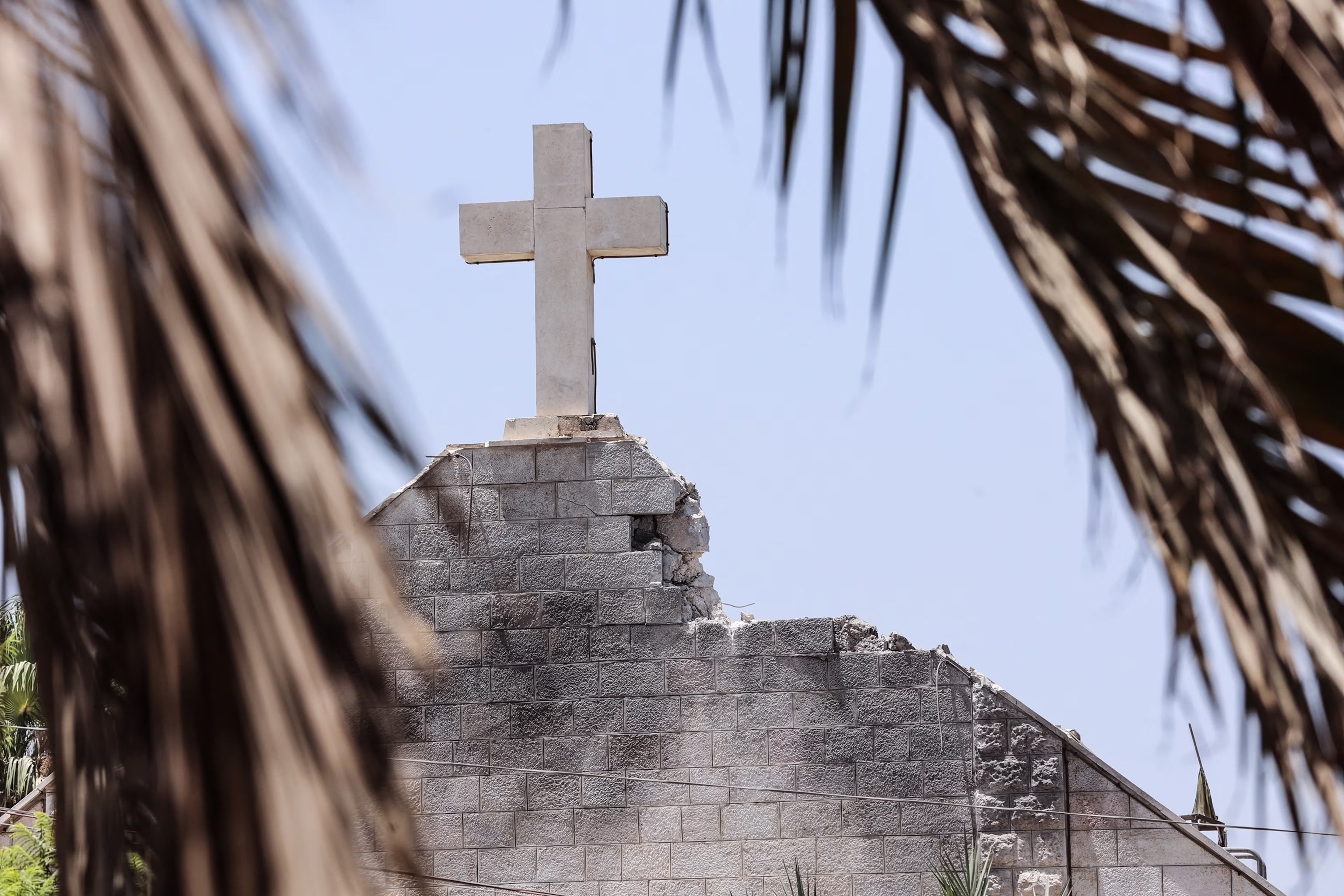In the ongoing conflict between Israel and Hamas, Gaza has become a landscape of destruction, with Israel employing controlled demolitions and airstrikes to target what it claims are military threats. One incident that has drawn significant attention is the recent strike on Gaza’s only Catholic church, the Holy Family Church, which killed three people and injured several others, including its priest.
This event, labeled an “accident” by Israeli Prime Minister Benjamin Netanyahu, has sparked outrage, including from U.S. President Donald Trump. Yet, despite this and a history of similar excuses, Israel continues to enjoy robust support from certain Christian groups and the United States.
The Holy Family Church Strike: An Incident That Shook Allies
On July 17, 2025, an Israeli military operation in Gaza City resulted in a shell striking the Holy Family Church, a sanctuary sheltering Christians and Muslims, including children with disabilities. The attack killed three civilians and wounded ten others, among them Father Gabriel Romanelli, the church’s priest. Netanyahu swiftly expressed regret, calling it a “stray ammunition” incident and promising an investigation. The Israeli Defense Forces (IDF) later attributed the strike to shrapnel from a tank shell fired in the area, insisting it was unintentional.
The incident provoked a rare rebuke from President Trump, who reportedly called Netanyahu to voice his frustration, with White House Press Secretary Karoline Leavitt noting that Trump’s reaction “wasn’t positive.” Other leaders, including Italian Prime Minister Giorgia Meloni and Pope Leo XIV, condemned the strike, with the latter renewing calls for a ceasefire. The church, a symbol of Gaza’s tiny Christian community, had been a refuge amid the war, making its destruction particularly poignant.
A Pattern of “Accidents”? Israel’s Controlled Demolitions in Gaza
The strike on the Holy Family Church is not an isolated event but part of Israel’s broader military strategy in Gaza, which includes controlled demolitions and airstrikes. These operations aim to dismantle Hamas’s infrastructure but have frequently devastated civilian areas. The UN reports that over half of Gaza’s religious and cultural sites, alongside 90% of its schools and universities, have been destroyed. The Gaza Health Ministry claims over 58,600 Palestinians have died in Israeli attacks, though the figures blend combatants and civilians.
Netanyahu and the IDF consistently frame incidents like the church strike as accidents, asserting they do not target religious or civilian sites. However, this explanation has worn thin for many. The Holy Family Church had previously been damaged by Israeli strikes, and historical examples—like the 2023 bombing of a 1,600-year-old Christian church in Gaza—suggest a recurring pattern. Critics argue that these “mistakes” reflect either negligence or a deliberate tactic to weaken Gaza’s social fabric, masked by claims of error.
Controlled demolitions, in particular, are a hallmark of Israel’s approach, intended as precise strikes against tunnels or weapon caches. Yet, the collateral damage—crumbled homes, mosques, and now a church—raises questions about their precision and proportionality, fueling accusations of violations of international law.
Trump’s Reaction: A Moment of Tension in a Solid Alliance
Trump’s displeasure over the church strike stands out against his otherwise staunch support for Israel. Since returning to office, he has bolstered military aid, including heavy bombs, and endorsed Israel’s broader objectives, such as potential West Bank annexation. His call to Netanyahu after the incident was a rare public sign of friction, yet it did little to alter the U.S.-Israel alliance.
Trump’s broader vision for Gaza has included eyebrow-raising proposals, like suggesting the U.S. “take over” the enclave and transform it into a “Riviera of the Middle East.” These ideas, floated in early 2025, drew criticism for their impracticality and disregard for Palestinian sovereignty. Despite his frustration over the church, Trump’s administration continues to see Israel as a key partner in countering Iran and its proxies, including Hamas—a strategic bond that overshadows occasional disputes.
Christian Support for Israel: Faith Over Fallout
Perhaps the most striking paradox is the continued backing Israel receives from certain Christian groups, especially U.S. evangelicals, despite actions that harm Christian sites and communities. The destruction of the Holy Family Church, which displaced Palestinian Christians, might have been expected to erode this support. Instead, groups like Christians United for Israel remain steadfast, driven by a belief that Israel’s existence fulfills biblical prophecy.
Evangelical leaders have even urged Trump to support Israel’s annexation of the West Bank, a policy that could further marginalize Palestinians, including Christians. This stance contrasts with other Christian voices—such as Palestinian theologian Daniel Bannoura—who criticize Israel’s actions and advocate for a two-state solution. Yet, the evangelical bloc’s political influence in the U.S. ensures Israel retains strong backing, even as its strikes hit Christian targets.
This support persists despite the shrinking Christian population in Gaza and the West Bank, where military operations and settlement expansion have displaced many. The irony is stark: a theology rooted in Christian Zionism props up policies that undermine the very communities it claims to cherish.
Undermining America and Christians? A Critical Perspective
The query posits that Israel’s actions undermine America and Christians, a claim with both evidence and counterpoints. The church strike strained U.S.-Israel relations momentarily, with Trump’s reaction signaling discomfort. Globally, it damaged Israel’s image, drawing ire from figures like Pope Leo XIV and risking diplomatic fallout for the U.S. as Israel’s chief ally. The displacement of Palestinian Christians, a direct result of Israel’s policies, further weakens the Christian presence in the Holy Land—a loss felt by the global church.
Yet, the U.S.-Israel partnership endures, rooted in shared security interests and domestic political dynamics. Evangelicals’ sway over Republican policy, combined with Israel’s role as a bulwark against Iran, ensures American support remains firm. Netanyahu’s February 2025 meeting with Trump reinforced this, with talks of a “New Middle East” where Israel dominates with U.S. backing. Critics argue this alliance comes at a cost: eroded U.S. credibility in the region and complicity in actions that harm Christian minorities.
Israel’s repeated “accident” excuse, meanwhile, tests the patience of even its allies. If these incidents are indeed mistakes, they reveal a troubling lack of precision; if intentional, they suggest a cynicism that exploits U.S. and Christian goodwill. Either way, the unwavering support from Washington and evangelical circles raises questions about whose interests are truly served.









Share:
The Wall Street Journal’s Claim: A Provocative Letter from Trump to Epstein
DOJ Moves to Release Epstein Grand Jury Transcripts Amid Public Pressure, But Questions Remain